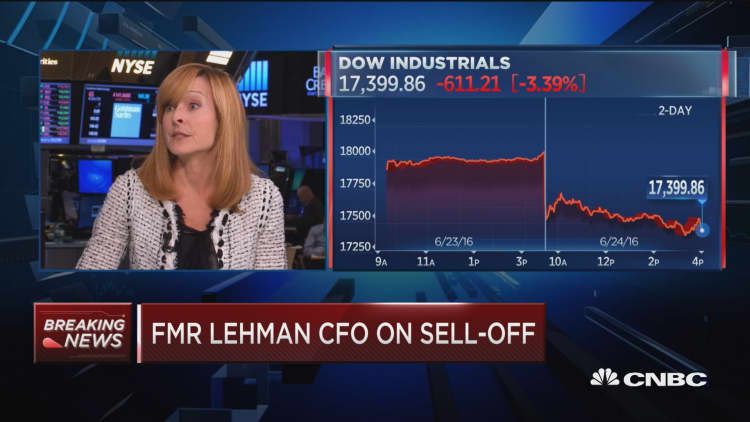
The sharp market sell-off Friday on the heels of the Brexit vote may have some worrying about a potential Lehman moment looming ahead, but former Lehman CFO Erin Callan Montella said there is one big difference between now and then.
"We have functioning capital markets," she said in an interview with CNBC's "Closing Bell" on Friday.
"There is no particular institution that we're looking at when we say who's next."
And as long as there are functioning capital markets, there is a way to get through this, she added.
"There'll be near-term volatility; there will be some pain. We do have something that in the end will work for liquidity purposes and for capital raising purposes."
On Thursday, the U.K. surprised the markets by voting to leave the European Union. The Dow Jones industrial average closed down more than 600 points Friday, with financials posting their worst day since 2011.
As the world awaited the outcome of the vote, Alexander Stubb, Finland's former prime minister, warned Thursday that a vote to leave would parallel the 2008 collapse of Lehman Brothers. That event triggered the global financial crisis.
Montella, who wrote a memoir about her experience at Lehman called "Full Circle," noted that right now she doesn't see an issue with the U.K. banks because the banks have collateral and the Bank of England has articulated its strategy regarding dealing with the liquidity situation.
However, the situation is challenging because "is this long-term capital, or is this 2008 and a full-blown crisis that is pervasive and permanent and is going to affect everybody? It's hard to know in the moment which one is happening," she said.
Montella imparted a lesson she learned during the Lehman collapse — do not underestimate the pervasiveness and significance of an event. And to listen to stakeholders — whether they are shareholders or a politician's constituency — because these days everyone is in the confidence-sensitive business.
"At a certain point, you can't substitute your judgment entirely for your stakeholders, and so you have to try to filter in the feedback and make your decisions accordingly."


